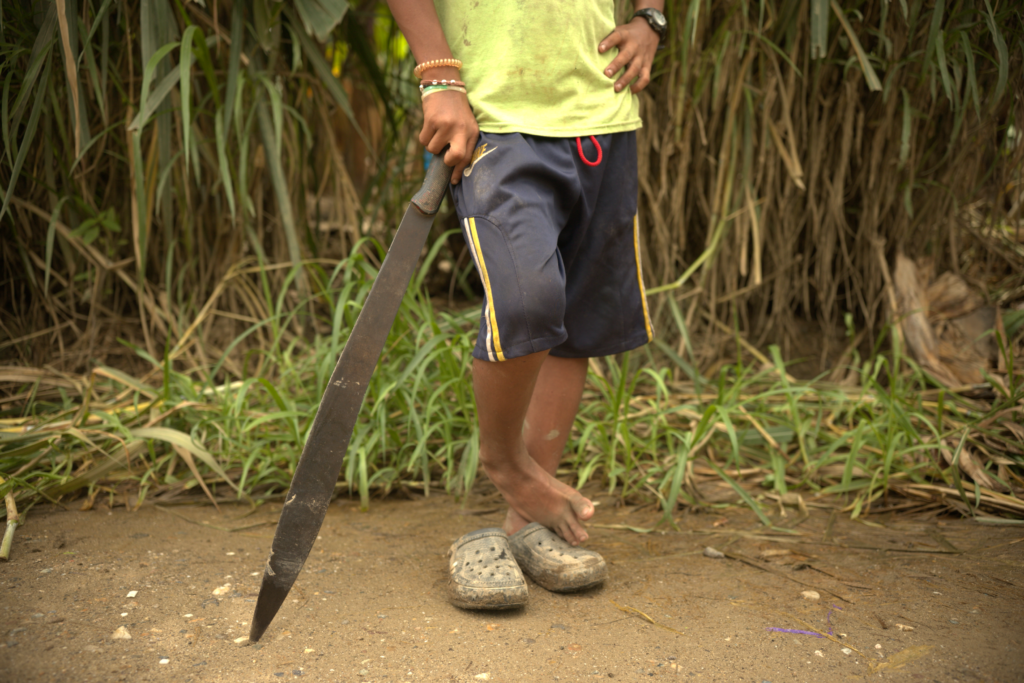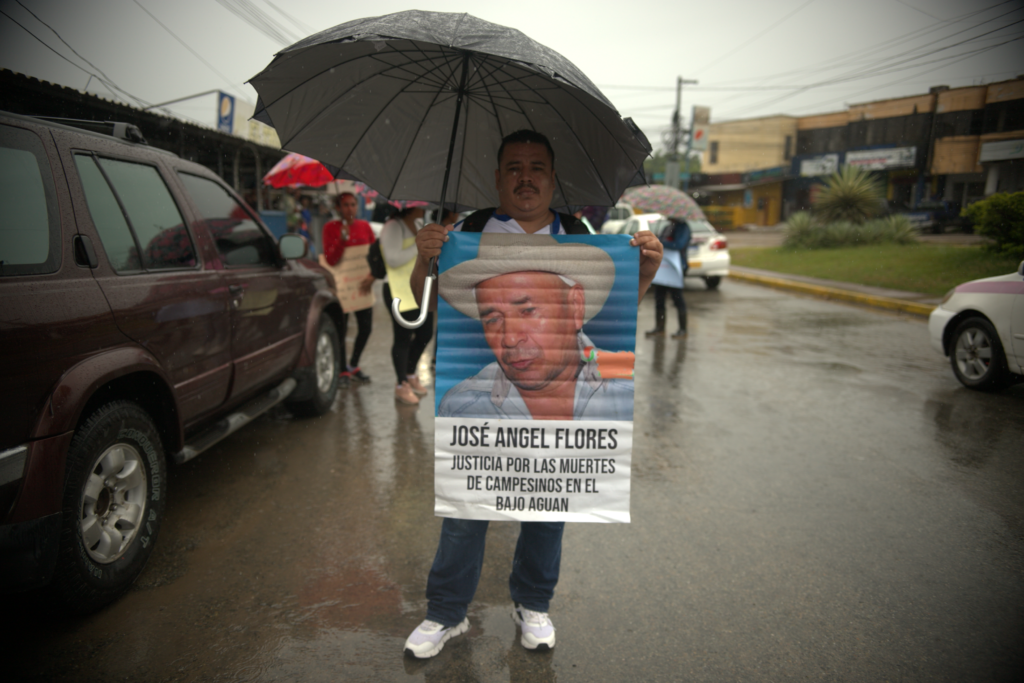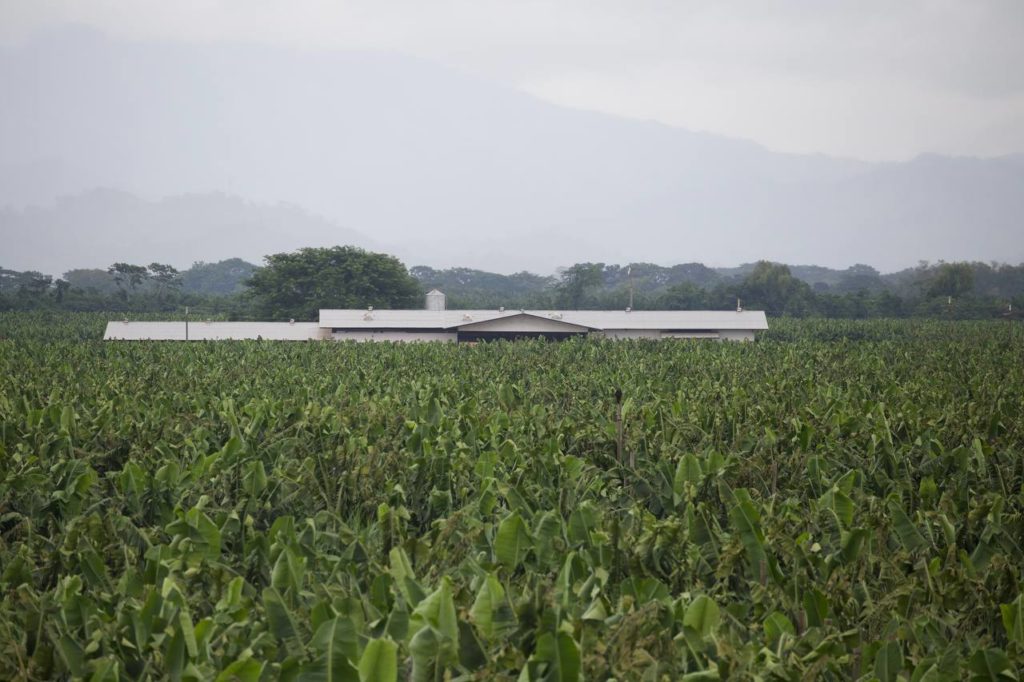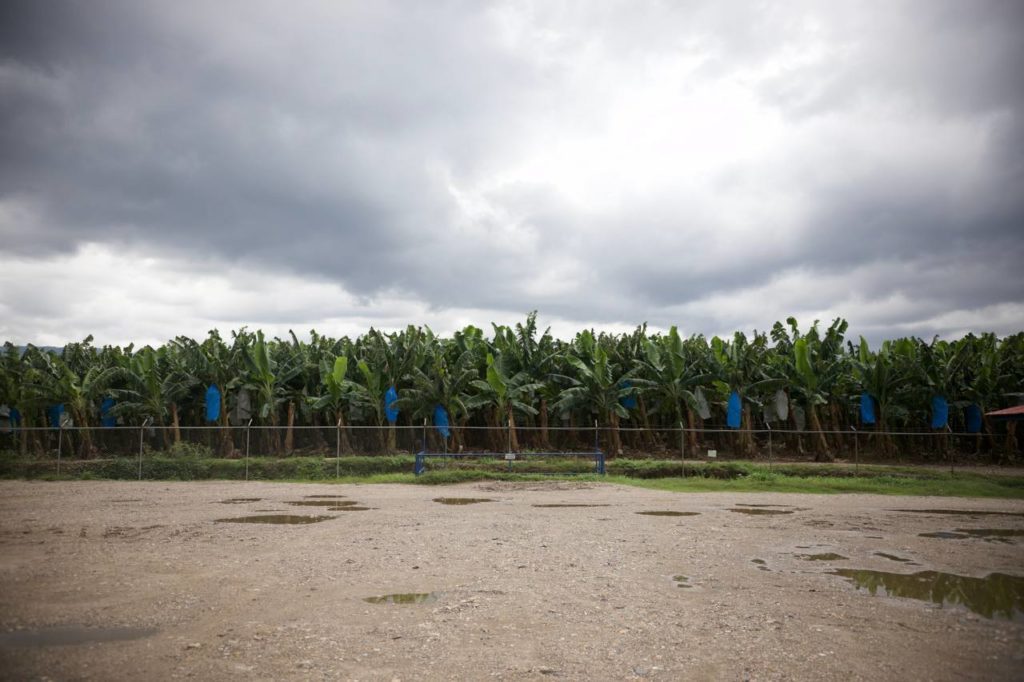Violence against campesino families, and legal actions against leaders in Bajo Aguán, in northern Honduras, intensify almost two years after the signing of a tripartite agreement between the Government, the Coordination of Popular Organizations of Aguán (COPA) and Plataforma Agraria that sought a solution to the conflict. The most recent case of eviction and murder in land owned by Empresa Asociativa Campesina de Isletas (EACI), a signatory to the agreement, shows the complicity between State security forces and the interests of a transnational banana corporation worth billions.
Text: Contracorriente
Translation: José Rivera
English edit: Amy Patricia Morales
Despite promises made by the the Castro administration to the campesinos in Bajo Aguán, State security forces continue to violently evict communities and spill blood in order to protect the interests of large agriculture companies, both national and transnational.
The most recent developments took place on November 24, when 100 families from EACI were evicted, an action for which a court order was issued. Approximately 900 police officers and members of the Cobra special forces carried out the eviction. Denunciations by campesino organizations of fraud and irregularities in the acquisition of that land by Empresa Agrícola Santa Inés, a subsidiary of Dole Food Company, have not been addressed.
On October 14, these families relocated to the Guanacaste, La Paz, and Esperanza farms, located in the community of Isletas, in the municipality of Sonaguera, department of Colón. Kevin Meza, a 24-year-old Honduran and member of EACI, was murdered that evening. Campesinos describe that evening as an ambush from National Police and private security guards of the company, a version that matches with that of the Secretariat of Human Rights (Secretaría de Derechos Humanos).
Another eviction was carried out on October 2, in which 800 police officers executed a court order, displacing families from EACI in a different location within the municipality of Sonaguera. Vast quantities of banana are produced in this land and later exported by Dole Fruit Company to the U.S. According to the Center for Democracy Studies (Centro de Estudio para la Democracia – Cespad), this is the focal point of the Aguán conflict.
Evictions and murders are taking place despite the signing of an agreement between the Castro administration, the Coordination of Popular Organisations of Aguán (COPA) and Plataforma Agraria in February 2022 to investigate human rights violations and to find a solution to the land conflict in Aguán Valley.
The intentions behind the agreement contrast with the creation of the Commission of Agrarian Security (Comisión de Seguridad Agraria) and the inability of the Secretariat of Human Rights to demand private companies and other public institutions a halt to the acts of violence and violations of human rights in the area. According to data from the campesino movement, ten environmental activists and land defenders have been murdered in 2023 alone.
Despite all setbacks, campesino organizations have protested in front of government institutions, in their communities and in Tegucigalpa, Honduras’ capital, demanding justice and respect for their rights. They also accuse authorities of conniving with transnational corporations to persecute them.
Blood, violence and impunity in Aguán Valley
When EACI occupied the farm premises, employees from Empresa Agrícola Santa Inés could not enter to harvest the banana bunches and prepare them for exportation at the processing plant. This caused anger among the hundreds of employees who live in the surrounding community because the company stopped paying them during that time, so they decided to protest and demand that campesinos leave the farm.
This is why anyone who entered the farm had to go through a rigorous process. Only people who were expected were allowed near the premises, and the company carried out surveillance on the campesinos with a drone that flew over the farm every now and then. Campesinos don’t know if the drone belongs to the company or to the State, but they do know that it’s used to protect the interests of the company by identifying campesinos to then bring charges against them.
Campesinos don’t know who fired the shot that killed Kevin Meza on the evening they took over the farm either. However, they are certain that it was no coincidence that the farm’s front gate was not secured and the police and private security were waiting to ambush them in the obscurity at night, at about 500 meters from the entrance.
“They started the assault and began shooting not at the air but at us. We were falling back, and suddenly one of our comrades fell, he was shot in the forehead. When they heard that they killed someone, they ran, but they came here with the intention to kill,” one of the young campesinos said. He later showed us a recording of that evening when gunshots were heard and the moment they found their comrade spilling blood on the land that he tried to defend. A few weeks after the crime, campesinos were still covering the traces of blood with soil.
Members of EACI said the occupation of that land is legal and they have documents that prove that they are the rightful owners. However, the government must carry out investigations to determine that all previous owners were properly registered as such and to find out if illegal contracts of sale took place. This must be done to solve the conflict.
“The police are on their payroll and they are paid well. They work together with the company’s security guards and act in their favor, not ours. We ask the government that they come here as soon as possible to solve this issue because the situation is uncertain. If they force us out of the land, we will return shortly because we have been fighting for 33 years. The process to repossess our land began 33 years ago because they took everything from us,” another campesino said.
The campesinos covered their faces and remained anonymous for their own safety. Many of them have not known each other for a long time since the process to occupy the land started by visiting villages and communities of landless campesinos, including those who live in other departments. They are invited to be a part of the cooperative and prepare them for the moment the land is recovered.

The land was occupied for a period of 34 days, the longest time these campesinos have had possession of it since the early 1990s. According to their statements, they were dispossessed of properties which had been granted to them during the agrarian reform through land redistribution.
During those 34 days, campesinos ensured the safety of the farms, patrolled hundreds of acres of banana plantations, prepared food for more than 150 families who supported the repossession of land and supervised processing plants owned by the transnational corporation. In addition, in the mornings they gave away some of the banana bunches that were still in good condition to inhabitants from the community after operation by the company came to a halt. All of these activities were undertaken with diligence and rigorous coordination, while seven of their comrades were being tried in Tegucigalpa.
In that context, as a way to demand fulfillment of the agreement between the government and campesino organizations, to which EACI is a signatory, campesinos from Plataforma Agraria and COPA went to the streets in Tegucigalpa on November 20, mainly to demand that persecutions and evictions by the judicial branch and State security forces stop. Campesinos were hoping to be heard at the Presidential Palace and National Congress, but both entities ignored their visit to the capital and their demands.
Almost three months after the murder of Kevin Meza, demands to solve the case have not been addressed. However, Guido Eguiguire, vice-minister at the Secretariat of Human Rights, said the police was involved in the ambush against members of EACI, and if the investigation confirms this, police and private security forces must be held accountable.
“Weapons used by the police and private security forces should be seized. There are no legal provisions that allow private security forces to shoot at people in any kind of operation, but we have only spoken to campesinos. We don’t have the capacity to impose actions on the police or private security,” Eguiguire said.
According to information received by Contracorriente, the Technical Criminal Investigation Agency (Agencia Técnica de Investigación Criminal – ATIC), a unit in the Attorney General’s Office, is investigating the crime, and the body was exhumed to complete the autopsy report. In addition, weapons from police officers involved in the operation were seized. However, no results have been made public of such investigation to date.
Contracorriente called the offices of Empresa Agrícola Santa Inés to know their version of the events, but there was no reply.
The ineffectiveness of the government and the power behind the banana industry
“We condemn the criminalization by the secretary of security against campesinos of EACI,” a thin cardboard with black and red letters read. It was held by a woman under the rain during a protest organized by members of Plataforma Agraria in the city of Tocoa, department of Colón, on October 18. The protest was held in memory of the murder of Carlos Escaleras 26 years ago and the crimes against José Angel Flores and Silmer George seven years ago; they were environmental activists and land defenders in Bajo Aguán.
The protest took place only a few days after Kevin’s murder. Neither fear that another crime could happen, nor the rain, nor the flooded streets in a city without an adequate drainage system stopped the campesinos. Dozens of families marched through the city demanding justice and a halt to actions by the State to criminalize campesinos.

Later that day, Esly Banegas, president of COPA and human rights activist, explained to Contracorriente that although the Commission of Agrarian Security was created as part of the agreement, there have been no results, and work is inadequate mostly due to poor coordination by Francisco Fúnez, head of the National Agrarian Institute (Instituto Nacional Agrario – INA).
We interviewed Banegas at the COPA offices, a place that could be compared to a bunker, representative of the violent and bloody conflict taking place in the area. The level of security is understandable considering the multiple assaults against them that have taken place as soon as they leave the offices.
Banegas was a victim of those assaults, and one of his sons was murdered in November 2016.
“Despite the agreement, people have been murdered and investigations are not being conducted, even under the new administration. To make matters worse, the Military Commission doesn’t seem to address the root of the agrarian conflict. They should not forget that the roots of the narco-dictatorship are deep, and the lack of investigations perpetuates impunity,” Banegas said.
According to a report by the Center for Democracy Studies on the agrarian conflict, the slow rate at which the conditions of the agreement with the government are fulfilled are due in part to “the lack of experience and necessary skills by government officials to deal with this kind of conflict.” The report also says that the government doesn’t even have an inter-institutional strategy and a budget.
Organizations claim that instead of working to find a solution to the agrarian conflict, the Castro administration announced the creation of the Commission of Agrarian Security and Access to Land from the National Commission of Defense and Security in June 2023. This action represents quite the opposite of what organizations expected from the administration such as repressive actions to evict occupied farms.
The Secretariat of Human Rights—the institution that seems more concerned with violence perpetrated against campesinos in El Aguán, at least according to statements by Eguiguire—is excluded from the commission.
“Our duties at the Secretariat consist of observation and consultancy since we don’t have the ability to directly solve local conflicts. Besides, local authority is exercised by the mayor and the Secretariat cannot impose any changes locally,” Eguiguire said. He’s talking about Adán Fúnez, the controversial mayor of Tocoa who was mentioned by witnesses in trials against drug traffickers in the U.S.
Fúnez has not made any recent statements about the conflict, but his past actions show that he responds to the interests of Empresa Agrícola Santa Inés, which surpass the borders of Colón.

A resolution presented at the Commission for Defense and Promotion of Competition (Comisión para la Defensa y Promoción de la Competencia) shows that Empresa Agrícola Santa Inés is part of a conglomerate whose parent company is Dole Food Company. This transnational company owns a total of 30 Honduran companies, which amounts to an investment of 21 billion lempiras ($852 million). Additionally, they own stocks at five other companies, some of which are part of the banking industry such as Inversiones Atlántida and Seguros Continental.
Dole Food Company, one of the largest fruit and vegetable exporters and distributors worldwide, reports annual profits of close to $4.5 billion. In Honduras, bananas are the ninth most exported product. This a powerful industry which might be the crucial link in understanding why the agrarian conflict has not been solved yet.






